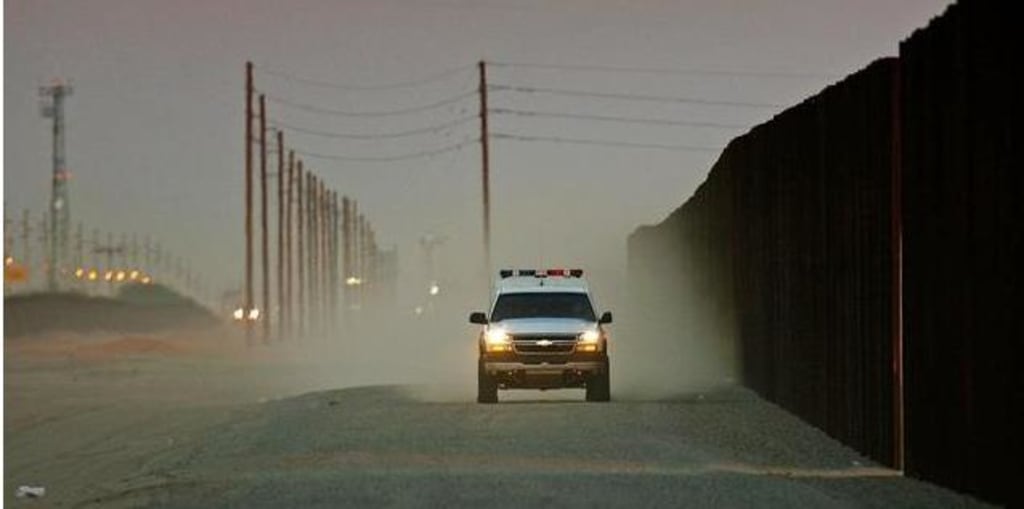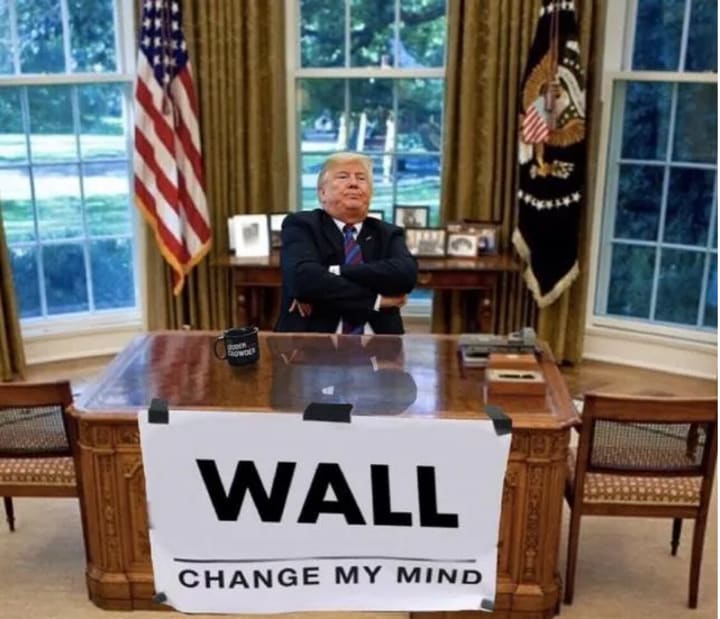Is the U.S.-Mexico border wall that Trump insists on fixing useful or not?
And look at the data analysis

The U.S. government was shut down for nearly a month over Trump's promise to build a wall on the U.S.-Mexico border. That broke Clinton's record for the longest shutdown in the history of the U.S. federal government.
Trump said a higher and more impenetrable wall than before was needed to stop the influx of illegal immigrants and drugs into the country.
Whether his true starting point is for the people or political success. What is undeniable is that he did make such a promise during the campaign.
First look, at the current state of the U.S.-Mexico border wall.
After the turn of the millennium, Republican politicians from border states lobbied the federal government to build a fence. In response, in October 2006, George W. Bush signed the Secure Fence Act into law, and it passed Congress with a bipartisan majority.
Congress authorized 700 miles (1,126.5 kilometers) of fencing in 2006, covering one-third of the total distance from the Pacific Ocean to the Gulf of Mexico.
Among the Democratic senators who supported it were Biden, Clinton, and Obama. Over the next four years, only 548 miles were eventually repaired, but that was already five times the length before then. Construction costs exceeded the budget by $2.3 billion. In addition, maintenance costs have increased by $450 million and will continue to grow.
How massive is Trump's promised U.S.-Mexico border wall?
And President Donald Trump's promise to build a "big, beautiful wall" along the rest of the 2,000-mile southern border has gone some way toward helping him get into the White House.
So really, how useful is a 548-mile border wall?
Although the number of illegal immigrants apprehended at the U.S.-Mexico border has decreased since the wall was built, some research institutions and experts have raised questions.
The Pew Hispanic Center, a research organization, estimates that the total number of people entering illegally through the U.S.-Mexico border is now less than a third of what it was at its peak.

Illegal border crossings peaked in numbers in 2000 when the U.S. Border Patrol apprehended 1.67 million people a year, more than 98 percent of whom were Mexicans. That figure dropped to just 400,000 by 2018. In 2017, data was available on the countries of origin of illegal immigrants, and only 42 percent involved Mexicans.
So the peak of smuggling at the U.S.-Mexico border was long past before Trump made a promise to keep building the border wall.
But as to whether the decline comes from the effects of the border wall, there is debate.
One view is that the main reason for the decline in smuggling at the U.S.-Mexico border is due to the economic crisis that erupted in 2008.
An analysis by economists at Dartmouth University and Stanford University shows that because those years also experienced a severe economic recession. And this severe recession and the end of the U.S. real estate boom, which lost a large number of construction jobs, undoubtedly played an important role in curbing migration.
Another piece of data shows that the number of illegal entries is also down in areas without a wall along the U.S.-Mexico border.
There is also recent specific data derived by economists. By using the Mexican government consulates to the country's U.S. citizens-issued identity card data derived (foreign media said the data is a confidential source), the existing wall has only led to a 0.6% reduction in the number of Mexican citizens migrating to the United States.
Therefore, in the U.S.-Mexico border migration reduction, the role of the border wall is limited. Even if the border wall is built as Trump wants to complete, it is likely to become another "Maginot Line".
The construction of a more closed U.S.-Mexico border wall will only do more harm than good.
Mexicans are migrating illegally to the United States because of the lure of well-paying jobs. Mexico's policy of raising wages tends to reduce migration. If a new, more closed border wall is built, the cost of cross-border trade between the U.S. and Mexico will increase over the same distance due to tariffs and border delays, causing Mexico's economy to suffer and its ability to address employment to decline.
Would this, then, be of great benefit to the U.S. economy? Again, the conclusion is, no.
The reduction in competition in the middle and lower end of the labor market will instead allow low-skilled workers without a college education to increase their income by a meager 36 cents. But the loss of hard-working, blue-collar workers could shrink the U.S., already short of cheap labor, by about $2.5 billion (0.02%) in GDP overall. This could leave college-educated Americans in a worse income situation.
Some economists have analyzed the percentage reduction in illegal immigration when the cost of cross-border trade is reduced by 25 percent, which is 34 percent higher than the effect of the Secure Fence Act. At the same time, the annual benefits of uneducated and educated American workers would increase by $59/person and $81/person, respectively.
All the data and conclusions suggest that if Trump's goal in building the border wall is to reduce illegal immigration from Mexico, it could have the opposite effect and also jeopardize trade relations with Mexico.
Unless he aims to prove to voters that he is a president who "keeps his word".
If Trump insists on keeping this promise, how much will it cost?
He had hoped to have $25 billion to build a border wall and an additional $5 billion from Congress for other border security measures but was unsuccessful.
A previous deal with Democrats allocated only $1.6 billion for border security.
Now, he is asking Congress to allocate $5.7 billion for the border wall. Earlier he threatened to consider bypassing Congress to declare a national emergency at the border if negotiations broke down to make progress on the matter.
Regardless of how Trump plays it, the Mexican government is not going to pay for this anyway.
About the Creator
Sue Torres
Is there any other reason to live to change the world?






Comments
There are no comments for this story
Be the first to respond and start the conversation.